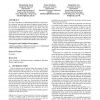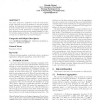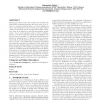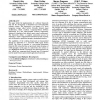ATAL
2009
Springer
14 years 6 months ago
2009
Springer
In a team competition, two participating teams have an equal number of players, and each team orders its players linearly based on their strengths. A mechanism then specifies how...
ATAL
2009
Springer
14 years 6 months ago
2009
Springer
Multiagent systems are often characterized by complex, and sometimes unpredictable interactions amongst their autonomous components. While these systems can provide robust and sca...
ATAL
2009
Springer
14 years 6 months ago
2009
Springer
The paper proposes a unification of the two main frameworks commonly used for the analysis of collective decisionmaking: the framework of preference aggregation, developed from t...
ATAL
2009
Springer
14 years 6 months ago
2009
Springer
Gaze is an extremely important aspect of human face to face interaction. Over the course of an interaction, a single individual’s gaze can perform many different functions, such...
ATAL
2009
Springer
14 years 6 months ago
2009
Springer
Multi-agent systems where the members are developed by parties with competing interests, and where there is no access to a member’s internal state, are often classified as ‘o...
ATAL
2009
Springer
14 years 6 months ago
2009
Springer
Decentralised coordination in multi-agent systems is typically achieved using communication. However, in many cases, communication is expensive to utilise because there is limited...
ATAL
2009
Springer
14 years 6 months ago
2009
Springer
ATAL
2009
Springer
14 years 6 months ago
2009
Springer
Decentralized partially observable Markov decision processes (Dec-POMDPs) constitute a generic and expressive framework for multiagent planning under uncertainty. However, plannin...
ATAL
2009
Springer
14 years 6 months ago
2009
Springer
This paper details the implementation of a software framework that aids the development of distributed and self-configurable software systems. This framework is an instance of a n...
ATAL
2009
Springer
14 years 6 months ago
2009
Springer
We consider the setting of multiple collaborative agents trying to complete a set of tasks as assigned by a centralized controller. We propose a scalable method called“Assignmen...




